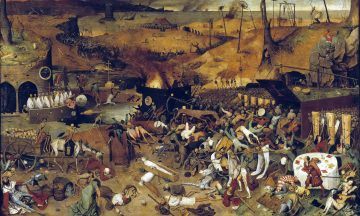Tim Adams in The Guardian:
 Twenty years ago, the US Department of Defense set out a clear warning: “Historians in the next millennium may find that the 20th century’s greatest fallacy was the belief that infectious diseases were nearing elimination. The resultant complacency has actually increased the threat.” Along with other western nations, federal and state governments in America had spent the previous decade or so dismantling public health programmes dealing with communicable diseases in order to concentrate funds on degenerative illnesses: diabetes, heart disease, cancer, stroke. Corporate investment in the development of new vaccines and antibiotics almost dried up, as if the battle that humans had waged over millennia against plague and pestilence had now been won – at least in the developed world. Michael Osterholm, the Minnesota state epidemiologist, informed US Congress in 1996: “I am here to bring you the sobering and unfortunate news that our ability to detect and monitor infectious disease threats to health in this country is in serious jeopardy. . . . For 12 of the states or territories, there is no one who is responsible for food or water-borne disease surveillance. You could sink the Titanic in their back yard and they would not know they had water.”
Twenty years ago, the US Department of Defense set out a clear warning: “Historians in the next millennium may find that the 20th century’s greatest fallacy was the belief that infectious diseases were nearing elimination. The resultant complacency has actually increased the threat.” Along with other western nations, federal and state governments in America had spent the previous decade or so dismantling public health programmes dealing with communicable diseases in order to concentrate funds on degenerative illnesses: diabetes, heart disease, cancer, stroke. Corporate investment in the development of new vaccines and antibiotics almost dried up, as if the battle that humans had waged over millennia against plague and pestilence had now been won – at least in the developed world. Michael Osterholm, the Minnesota state epidemiologist, informed US Congress in 1996: “I am here to bring you the sobering and unfortunate news that our ability to detect and monitor infectious disease threats to health in this country is in serious jeopardy. . . . For 12 of the states or territories, there is no one who is responsible for food or water-borne disease surveillance. You could sink the Titanic in their back yard and they would not know they had water.”
In the years since, as Frank Snowden’s illuminating history shows, that indifference became endemic. The World Health Organization has argued for years that the mechanics of our globalised economy, the dramatic increase in urbanisation and mass intercontinental travel has exponentially increased the chances for infectious disease to mutate and spread. It identified a record 1,100 “worldwide epidemic events” between 2002 and 2007. A year later, researchers identified 335 new human diseases that had emerged since the development of the polio vaccine in the late 1950s, most of them originating in animals (many in bats). “Their names now run the gamut from A to Z – from avian flu to Zika,” Snowden notes, “and scientists caution that far more potentially dangerous pathogens exist than have so far been discovered.” Yet still, when he finally acknowledged the destructive presence of Covid-19 in his nation’s population, the primary response of the president of the US was one of genuine surprise: “Who would have thought?”
More here.
